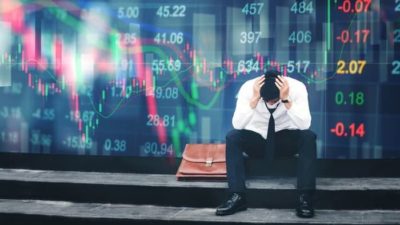A message from our CIO, Scott Phillips: "G'day Fools. If you're like us, you're dismayed by the events taking place in Ukraine. It is an unnecessary humanitarian tragedy. Times like these remind us that money is important, but other things are far more valuable. And yet the financial markets remain open, shares are trading, and our readers and members are looking to us for guidance. So, we'll do our best to continue to serve you, while also hoping for a swift and peaceful end to war in Ukraine."
________________
The benchmark S&P/ASX 200 Index (ASX: XJO) has started the week poorly and, at the time of writing, is tracking 1.29% lower at 7,019.3 points.
With the geopolitical tension in Europe, equity investors in Australia have no doubt been questioning what moves they can take to ensure their portfolios are protected during the turbulence.
However, one expert advises avoiding any knee-jerk reactions in response to the conflict.
Avoid making sudden portfolio decisions
Speaking to the Australian Financial Review, portfolio manager of SG Hiscock's High Conviction Fund Hamish Tadgell said that conflict like that seen in Europe might have far-reaching impacts on equity markets.
"Geopolitical events tend to result in sharp sell-offs but can also rebound quite quickly if economic growth is largely unaffected," Tadgell said.
As a result, simply reacting to the news whilst following short-term market movements is bound to cause trouble for even the most experienced investor, he adds.
Plus, in the past, global stock markets tend to make a snap-back quickly after taking a hit when there is news of conflict or similar. He warns those who sell may overlook the company and sector fundamentals. This is a naysay for long-term investors.
"This suggests being too reactionary and making sudden portfolio moves may, in hindsight, not necessarily be the right thing to do," Tadgell said.
As they say, never chop a tree down in the wintertime – you might need the shade during the summer.
What can be done?
Nevertheless, that doesn't mean one shouldn't be focused on making winning positions for the long-term based on the current secular trends, the portfolio manager notes.
"That said, we were already very overweight in energy and have had a reasonable commodity exposure given our view around inflation, investment required to decarbonise and increasing trade protectionism, and have some gold insurance," he said.
This kind of thinking is important given the current macro-climate, Tadgell notes, because the question remains as to what the Russia-Ukraine crisis might mean for global economic growth.
"The other consideration is how will Russia respond?" he added.
"While it has little incentive to curtail major commodities like oil and gas, the disruption of industrial metals like nickel or palladium could cause problems for international supply chains, and add to inflation risks."
Regardless, Australian benchmark indices have taken a hit this year as global macro-economic pressures mount in the form of inflation, supply chain headwinds, raw materials shortages and, of course, the conflict in Europe. Commodity baskets and the Australian dollar have been the exception, as shown on the charts below.

Whilst the S&P/ASX 200 Index (ASX: XJO) has fallen more than 5% since trading recommenced on January 4, and the iShares MSCI World Index Fund (NYSE: URTH) has fallen even more, most major commodity groups are within a full super-cycle. The March 2022 futures contract on Newcastle coal (NCFH2022), for instance, has gained more than 162% since December last year.










